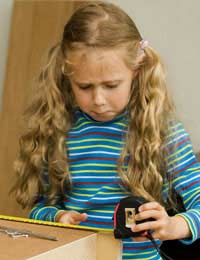Maths: Measurements

Measurement activities can help young children understand basic Maths concepts and learn valuable life skills. Developing the ability to estimate and to measure accurately takes time and practice. The following are some tips on helping your child to understand measurement.
What you can do
Find items about the house to measure – Encourage your child to look for items that are longer or shorter than a length of string, a shoe, a book or any other item of your choice. Use the shoe or book to measure the length of a radiator, a floor mat or a worktop. Fill different sized containers with water from a sink or bath, or sand from a sandbox, and establish which containers hold more and which hold less.Estimate everything – Get your child to guess how many steps there are from the front door to the gate and then walk the distance together, counting the steps as you go. Estimate how many cartons of milk will be needed for the week and at the end of the week count up how many were actually used. Estimate the time it will take to travel from one place to another. If your child thinks a trip will take 15 minutes, get them to work out what time they would need to leave to arrive at a particular time.
Discuss time – Have your child check the time on the clock when they get up, go to school, eat dinner, go to bed etc. Help them to look up the time of a particular programme they want to watch in a television guide. If you are travelling by bus or train look up the timetables together and discuss departure and arrival times. Make regular use of the calendar and help your child to fill in future events.
If you are measuring include your child in measurement activities – If you are baking a cake give your child the opportunity to measure some of the ingredients. If you are building a bookshelf discuss the length and the width that the bookshelf will need to be. When going grocery shopping, encourage your child to estimate what the items in the trolley will cost and how much change you should get from a particular sum of money.
Keep a daily temperature record – Measure the temperature each day, morning and evening for a week, and discuss how the temperature varied from day to day, and at different times of the day.
Organisation of household items – Young children can help to organise boxes or cans in order of height from tallest to shortest or vice versa. Compare heights using vocabulary such as “taller”, “shorter”, “bigger” and “smaller”.
Other Help
There are hundreds of websites online with Maths homework help including puzzles, games, worksheets and much more. These sites are designed to help children improve their Maths skills interactively and are a fantastic way to build your child’s enthusiasm for Maths. The most important way you can help your child with Maths is to remain positive at all times. Let them know that you think Maths is fun and that everyone can learn Maths.It is important that your child understands the reason that we learn Maths, so be sure to point out ways that Maths can be used in real life situations. Encourage your child to be persistent, even if they are having difficulties, and always praise your child for their achievements in working out a problem or grasping a new concept.


Re: Speaking and Listening: Storytelling
nice
Re: Starting a Homework Club
Hi I resently start with a homework club do I need to be rgister at socail workers and go to all that proces please need some at advice
Re: Starting a Homework Club
I'm trying to start a homework club business in my community. I wish I could get a mentor who would assist me step by step to achieve…
Re: Starting a Homework Club
Hello, I’ve recently opened my own private after school homework club but I could do with a lot of guidance (Perhaps a mentor) to help…
Re: Starting a Homework Club
Thank you for your info I set up one in my church as I see many struggling maths and science students From just a few we have grown…
Re: How Much Homework Should Your Child Be Getting?
My daughter has just started year 7. She can get 2-4 pieces of home work per day each from 30-45 mins…
Re: How Much Homework Should Your Child Be Getting?
My 8 year old (year 3) daughter gets almost no homework. We are ,and always have, pushed her to succeed,…
Re: How Much Homework Should Your Child Be Getting?
My daughter moved to secondary school in Wales in January 2019. Since then she has had one or two pieces…
Re: Keeping a Homework Diary
I love school I have been told I could go on this app to do homework ??!!
Re: How Much Homework Should Your Child Be Getting?
Are these comments a Joke! My son gets very little home work in year 10 and what he does get he…